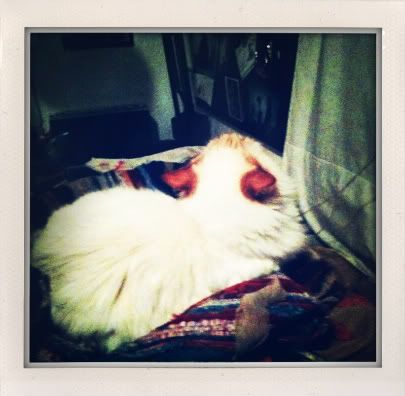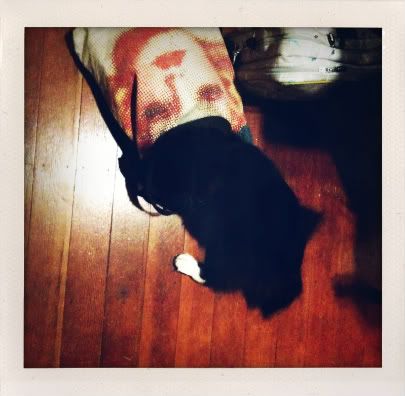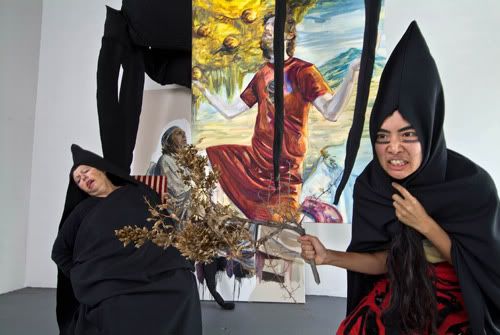

| ART:21: | When did you know you wanted to be an artist? |
| TUTTLE: | Before I went to kindergarten I really wanted to be an artist. Not that I knew what being an artist was, but on the first day of kindergarten the teacher handed out the paper and the colored crayons. And I just connected in my brain that this was the first day of my life, and that going to school was the start of everything that was important to me. I remember the drawing to this moment. I took a pencil and I just made this horizon line, and then I took the colored pencils and I made a rainbow there. And that was my drawing. I looked over and I saw that the other kindergarteners were doing their sun with the rays of the sun and drawing their flowers from the bottom of the page and all of that. And I knew that my drawing was more, say, advanced or sophisticated, but I also knew that I had lost a kind of innocence—irretrievably—that they still retained. And so I was a little bit pushed back in a state of confusion. Then, when the teacher collected the drawings, mine was not put up as one that was highly valued. I had to adjust to that, and of course I did, but my respect for the teacher was forever erased. But the story goes on...when I had my first show at the Betty Parsons Gallery when I was 23 or so, I looked over on the wall and saw a piece called "Hill." And it was kind of the same rainbow which the graphite line had changed into. It was a big, startling moment to me because that really was the first day of my life in a way and quite a way from kindergarten, which I had mistakenly thought was the first day, to my show in a New York gallery. |
Minilogue - Animals from ljudbilden on Vimeo.
of Montreal - Id Engager from Polyvinyl Record Co. on Vimeo.
DE POUSSIÈRE from querozenn on Vimeo.


HOOKED ON DESIGN Yokoo Gibran, in her Oatmeal Soopascarf, started a business on Etsy.
QUIT your day job?
To some craft enthusiasts that is just the name of a popular blog on Etsy, the fast-growing Web site that serves as a marketplace for crafts and vintage goods.
But to Yokoo Gibran, it was an epiphany.
Ms. Gibran, who is in her 30s, had been selling her hand-knit scarves and accessories on the site for less than a year when she decided last November to quit her day job at a copy center in Atlanta. Thirteen months later, she would seem to be living the Etsy dream: running a one-woman knitwear operation, Yokoo, from her home and earning more than $140,000 a year, more than many law associates.
Jealous? How could you not be? Her hobby is her job. But consider this before you quit your day job: at the pace she’s working, she might as well be a law associate.
“I have to wake up around 8, get coffee or tea, and knit for hours and hours and hours and hours,” said Ms. Gibran, who leveraged the exposure she got on the site to forge a deal with Urban Outfitters. “I’m like an old lady in a chair, catching up on podcasts, watching old Hitchcock shows. I will do it for 13 hours a day.” And even after all those hours knitting, she is constantly sketching new designs or trading e-mail messages with 50 or more customers a day.
“Etsy saved my life,” Ms. Gibran said. But, she added, “this is the hardest job I’ve ever had.”
These days, the fantasy of building a career on Etsy, an eBay of sorts of the do-it-yourself movement, is not just the stuff of dreams. Even before the recession, the site, which was founded in Brooklyn in 2005, was riding the “crafting” boom to prominence. When the job market collapsed, many hobbyists who already were selling jewelry or glassware as a sideline suddenly needed a real income.
While most people would find it impossible to meet a mortgage payment selling $8 crocheted mug cozies, some top-sellers on Etsy have moved beyond the stage of earning pocket money and are building careers — in some cases, earning six-figure incomes.
But even the successes add a note of “seller beware.” To build a profitable business on the site, they say — well, it’s a business. You need to build a brand identity, which often means courting design blogs or the news media. You need to manage distribution, which might mean standing in post office lines with a baby on your hip and a garbage bag filled with 30 self-packed boxes to ship. And as with any start-up, you need to maintain the morale of the labor force, which can be particularly challenging when you are the labor force, and the workday runs from “Good Morning America” to “Late Night With Jimmy Fallon.”
“Working from home, people think it’s so easy and great,” said Caroline Colom Vasquez, of Austin, Tex., who last year made $120,000 in sales from her Etsy shop, Paloma’s Nest, which specializes in ceramic and wood collectibles for weddings and other special occasions. But “there’s nobody there to tell you to take a break, or take a vacation.”
This year, she expects her business to have $250,000 in sales, but she will have to divide that with the three employees she just hired because Ms. Vasquez, who has a young daughter, could no longer handle the strain.
“I physically could just not do it in 24 hours,” she said. “My husband and I used to get up at 4 or 5 in the morning before the baby, then stay up till 1 or 2, stamping boxes, making shipping labels.”
As sales heated up for the holidays, Angie Davis, a former project architect in Minneapolis who lost her job last year, said her Etsy shop, Byrd and Belle, which sells handmade handbags and cases for iPods, laptops and cellphones, has “easily matched a month of architecture salary in five days, but I’m also working 16 hours a day.” To deal with the holiday rush, Ms. Davis said, she had to produce 112 cases in 48 hours, which involved turning her loft into a mini assembly line, where she cut leather and stitched and sewed cotton and wool fabric until 10 p.m. “It’s surprising how physical it can be on my core muscles,” she said. To get the work processed in time, she had to call in her mother from Iowa to help make tags and press fabric.
The number of people turning to Etsy as a full-time career is unknown. The site does not track how many of its members try to make a living, and it does not disclose the sales figures for individual sellers, said Maria Thomas, chief executive of Etsy. But over the last year, the number of registered members has more than doubled to 3.75 million, and the Quit Your Day Job blog on Etsy now attracts 2 million page views a month.
Several shop owners interviewed for this article, including Morgan Peterson, who runs a fashion label — Eliza + Axel — on Etsy, view their layoffs from traditional jobs as an opportunity to build a more fulfilling career online. In Ms. Peterson’s case, she lost her job as an assistant designer for Dillard’s and decided to create and sell her own line, made from reclaimed fabrics.
“In fashion school, they tell you you can do anything, they push you to be creative, but as soon as you get a job in a corporate environment, you’re only able to do certain things and it has to make money,” said Ms. Peterson, who said that she supplements her income on Etsy by selling wholesale to several boutiques. “With Etsy, I have my styles that make a lot of money, but I can also put work out there that I do just for creative reasons.”
(Page 2 of 2)
As with eBay, start-up costs are a lot lower for people opening a “shop” on Etsy than a shop on Main Street; the site charges sellers 20 cents for each item listed and 3.5 percent of each sale. Etsy, which has a user base consisting largely of women, also provides a support network, including several blogs and forums where sellers swap tips and words of encouragement.
A healthy income, however, is far from guaranteed. After Tara Scheuerman was laid off from her job as an office assistant at a college in Milwaukee, she started a company, Cracked Designs, that sells greeting cards and wedding invitations on Etsy. After a slow start, she said she is thrilled to be selling more than 50 cards a week and is optimistic about her long-term earnings, but said she now spends more than 40 hours a week on her line, not only designing and making her products, but tirelessly promoting them on design blogs like Poppytalk and Design*Sponge as well as in magazines (her cards were recently featured in House Beautiful). So far, she said, she is earning about $15,000 to $20,000 a year, which on the low end works out to about $7.25 an hour — the same as Wisconsin’s minimum wage.
“You have to be really realistic with your goals and know you’re probably not even going to make a profit the first couple of years,” said Ms. Scheuerman, 26, who relies primarily on her husband’s income.
Such experiences were the focus of an essay, much-circulated among so-called Etsians, that ran last June in DoubleX, an online lifestyle magazine. In it, the journalist Sara Mosle (also a contributor to The New York Times) argued that Etsy was profiting off unrealistic expectations held by many women. “What Etsy is really peddling isn’t only handicrafts,” Ms. Mosle wrote, “but also the feminist promise that you can have a family and create hip arts and crafts from home during flexible, reasonable hours while still having a respectable, fulfilling, and remunerative career.”
But the experiences of at least some of the site’s successes, like Ms. Vasquez, don’t support that view. Still, Ms. Vasquez said, there is an unforeseen psychic tax even when — or especially if — one’s profit outstrips initial expectations. As her business, once a sideline run from the kitchen table, grew into a six-figure powerhouse, her work not only swallowed more rooms of her house, but also her family life. At dinners, she and her husband talked only about business.
“I felt like I was being a bad mother, a bad wife, being all-consumed by business. That was the breaking point,” she said. Ms. Vasquez has found time to exhale, at least occasionally, since hiring a staff. The family even took a trip, the first since she started the business, to the nearby Texas Hill Country.
Still, the challenge is to find balance. “What’s the point of doing something you love,” she asked, “if you are too exhausted to do what you love?”


